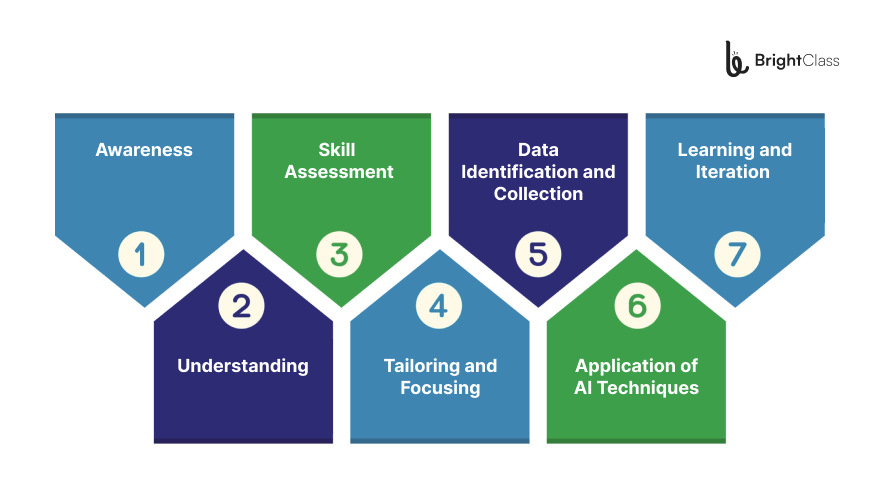
Are Your Teachers Ready for AI in Education? A Guide for Schools
Artificial Intelligence (AI) is transforming various sectors, and education is no exception. As we move towards a more technologically integrated future, educators must be prepared for AI's opportunities and challenges. But how can schools assess whether their teachers are ready for this shift? We outline a framework to help educators and institutions evaluate their AI readiness.
The Importance of AI Readiness in Education
AI has the potential to revolutionize education by offering personalized learning experiences, automating administrative tasks, and providing new insights into student learning patterns. However, to fully leverage these benefits, educators must be well-versed in AI technologies and their applications. This readiness involves technical skills, an understanding of ethical considerations, and the ability to adapt to new teaching methodologies.
A Seven-Step Framework to Assess AI Readiness
1. Awareness
The first step is ensuring that educators know AI's existence and relevance to education. This includes understanding the basic concepts of AI and recognising its potential to enhance teaching and learning.
2. Understanding
Educators should have a foundational knowledge of AI technologies. This includes understanding how machine learning works, what data-driven decision-making entails, and the ethical implications ofAI in education.
3. Skill Assessment
Teachers need to assess their current skills and knowledge related to AI. This self-assessment helps identify areas where further learning or training is required.
4. Tailoring and Focusing
Identifying specific challenges that AI can address within the educational context is crucial. Educators should prioritise these challenges and focus on those that are most pertinent to their teaching environment.
5. Data Identification and Collection
Data is the backbone of AI. Educators must know what data is available, how to collect new data if needed and understand the data collection and analysis methods.
6. Application of AI Techniques
Once data is collected, educators need to apply AI techniques effectively. This involves choosing the right tools and methods for their specific needs and understanding how to use these tools to improve educational outcomes.
7. Learning and Iteration
AI integration is an ongoing process. Educators should be able to analyse results, interpret them correctly, and be willing to iterate on their strategies. This also includes addressing any ethical issues that may arise from using AI.
How BrightClass Can Help
As schools navigate the complexities of integrating AI into their educational frameworks, tools like BrightClass can be invaluable.BrightClasshelps schools by providing AI-driven lesson plans, assessments, and data analytics, which are crucial for making teachers AI-ready. By leveraging these tools, schools can ensure that their educators are prepared to use AI and empowered to enhance their teaching methods and improve student outcomes.
AI Readiness Checklist for Educators
To help you assess the readiness of your teaching staff, here’s a quick checklist:
- Awareness:
- Are you familiar with the basic concepts of AI?
- Do you understand the potential benefits and challenges of AI in education?
- Understanding:
- Do you have a basic understanding of how AI technologies work?
- Are you aware of crucial AI concepts like machine learning and data-driven decision-making?
- Skill Assessment:
- Have you evaluated your current skills related to AI?
- Do you know where you need further learning or training?
- Tailoring and Focusing:
- Can you identify specific educational challenges that AI could address?
- Are you able to prioritise these challenges?
- Data Identification and Collection:
- Do you know what data is available and how to collect additional data if needed?
- Are you familiar with data collection and analysis methods?
- Application of AI Techniques:
- Do you know which AI tools and methods are suitable for your needs?
- Are you prepared to apply these tools effectively?
- Learning and Iteration:
- Can you analyse and interpret the results of AI applications in your teaching?
- Are you open to iterating on your strategies based on outcomes and ongoing learning?
- Are you prepared to address ethical considerations related to AI usage?
By regularly revisiting this checklist, schools can ensure that their educators remain at the forefront of AI integration in education, paving the way for a more innovative and effective learning environment.